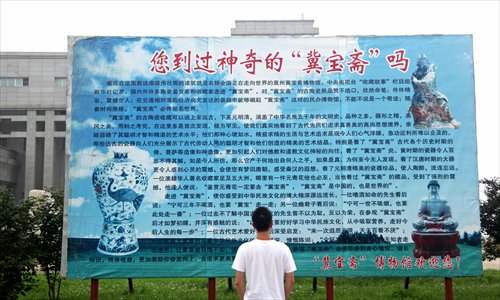Museum shut over fake exhibits

A visit browses the introduction board erected by the Jibaozhai Museum in Jizhou, Hebei Province. The museum has been officially shut down as most of its collections were revealed to be fake. Photo: IC
A museum in a village in Hebei Province has been shut down as most of its collections were reported to be fake, provincial cultural heritage authorities confirmed Monday.
The Jibaozhai Museum in Erpu village, Jizhou, has had its license revoked by Jizhou civil affairs bureau, and its mangers are under investigation, an official from Hebei Provincial Cultural Heritage Bureau, surnamed Li, told the Global Times.
"Jibaozhai has no qualification to be a museum as its collections are fake and it hasn't reported to my department for approval," said Li.
Founded in 2007, the 4-hectare Jibaozhai was opened in 2010. With 12 exhibition halls, it cost 540 million yuan ($88 million) to develop. It was designated a Grade 3A scenic spot and a patriotic education center by local authorities.
Jizhou authorities launched an investigation into the museum on Wednesday after media reports alleged the relics were fake.
This was sparked after Ma Boyong, a popular Beijing-based writer of short stories and novels, posted pictures from the museum on July 6 on his Sina Weibo and wrote that he didn't believe the descriptions of the exhibits matched the actual objects.
Villagers have long been opposed to the museum, and have accused Wang Zongquan, the village's Party chief and curator of the museum, of buying fake relics and misappropriating funds after village land was sold.
"Most of the historic relics are fake, but the real ones are in Wang's home," Liu Xin-
liang, a resident of Erpu, told the Global Times. He alleged that Wang never submitted proper invoices for what he bought.
After their land was sold to real estate developers for millions of yuan, each villager just received 20,000 yuan in compensation. The whole population of 1,500 signed a petition protesting the museum construction, Liu said. "But this still didn't prevent Wang from buying relics and building Jibaozhai."
Wei Yingjun, general consultant for Jibaozhai, told the Global Times that most of the exhibits have not been appraised by experts and Jibaozhai has been making a loss. However, he insisted that lots of the relics are "very good" but was unsure when the museum will reopen.
The village's former accountant, Yang Baoqian, told the Beijing News that most pieces cost from 100 to 2,000 yuan, and the total value of the collection is 30 million yuan. But Wang told the newspaper that the museum's 40,000-piece collection is worth 20 million yuan, adding that the money used to build the museum came from profits from the village factories, and the cash from land sales was all allocated to the residents.
Other villagers told the paper that they suspect Wang used the museum to launder money.
Similar fake museums are found all over the country for momentary gain, Ma Weidu, an antique collector and curator of the Guanfu Museum, told China Radio International.